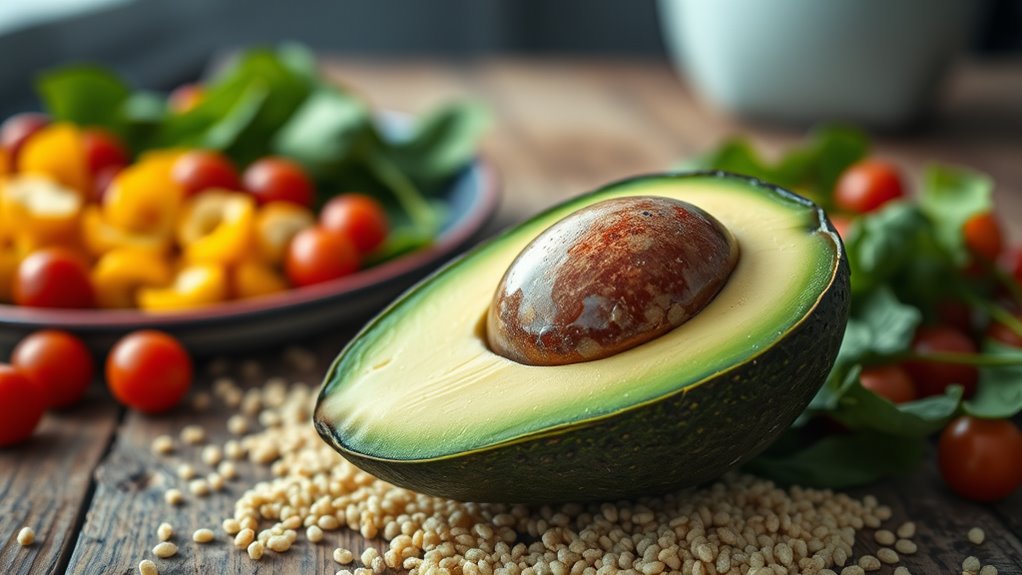Are You Fueling Your Body or Just Eating Empty Calories.
Are you fueling your body or just eating empty calories? If you’re consuming a lot of sugary beverages and processed snacks, you’re likely leaning toward empty calories. These foods offer little nutrition and can lead to weight gain and cravings. Instead, focus on nutrient-dense options like fruits, vegetables, and whole grains. Making smarter choices can improve your health and wellbeing. Discover some effective strategies to cut back on those empty calories!
Key Takeaways
- Empty calories come from foods high in added sugars and unhealthy fats, offering little to no nutritional value.
- Sugary beverages and processed snacks are major sources of empty calories, contributing to weight gain and nutrient deficiencies.
- Diets high in empty calories can lead to chronic diseases and impair overall health due to inadequate vitamins and minerals.
- Prioritize nutrient-dense foods and practice meal planning to avoid impulsive consumption of empty-calorie snacks.
- Mindful eating and healthier food swaps can help ensure you are fueling your body effectively rather than consuming empty calories.
Understanding Empty Calories: What Are They?
Empty calories come from foods that offer little to no nutritional value, often packed with added sugars and unhealthy fats. You might find yourself reaching for these highly processed foods, thinking they’re satisfying, but they don’t deliver real nutrition. Instead of fueling your body, they contribute to nutrient deficiencies and can lead to weight gain. When you compare real nutrition vs junk, you’ll see that whole foods, like fruits and vegetables, provide essential vitamins and minerals your body craves. Furthermore, high added sugar intake reduces consumption of essential nutrients, exacerbating the issue of empty calories. This reliance on processed foods can create a cycle of poor eating habits that negatively affects your overall health.
Major Sources of Empty Calories in Your Diet
When you reach for sugary beverages, you’re likely adding a significant amount of empty calories to your diet. From sodas to sweetened teas, these drinks can quickly undermine your nutrition. Similarly, processed snacks often pack in empty calories, making it essential to be mindful of your choices. In fact, nearly 40% of energy consumed by 2- to 18-year-olds comes from empty calories, highlighting the importance of making healthier beverage and snack choices. Regularly consuming these empty calories can lead to nutritional deficiencies, as they provide little to no essential nutrients needed for optimal health.
Sugary Beverages Impact
While many people enjoy sugary beverages for their taste and convenience, these drinks are major sources of empty calories in your diet. Regularly consuming sodas, energy drinks, and sweet teas can lead to weight gain and health issues like diabetes and heart disease. These beverages often contain added sugars, hidden under names like high-fructose corn syrup, providing little to no nutritional value. You mightn’t feel full after drinking them, which can result in overeating. Hydration is essential, but the type of liquid consumed is crucial, and opting for healthier choices can make a significant difference in your overall well-being. In fact, detoxification processes are hampered by high sugar intake, making it harder for your body to maintain optimal health.
The USDA suggests limiting added sugar to no more than 10% of your daily calories. By choosing water or unsweetened alternatives, you can reduce your intake of these empty calories and support your overall health.
Processed Snack Choices
Many people don’t realize that processed snacks are major culprits of empty calories in our diets. Items like chips and cookies might be convenient, but they’re often loaded with added sugars and unhealthy fats. Consuming these snacks regularly can lead to weight gain and nutrient deficiencies, as they lack essential vitamins and fiber. This is particularly concerning because empty calories do not promote a feeling of fullness, leading to overeating. Additionally, many of these snacks undergo extensive processing, which can strip away crucial nutrients.
Consider the impact of your snack choices:
- Potato Chips: High in fats and sodium, risking hypertension.
- Energy Bars: Often processed, with little nutritional value.
- Packaged Cookies: Loaded with sugars and unhealthy fats.
- Prepared Popcorn: Flavored varieties can be deceptively unhealthy.
The Impact of Empty Calories on Nutrient Intake
When you consume too many empty calories, you’re at risk of developing nutrient deficiencies that can harm your overall health. These calorie-rich but nutrient-poor foods can distort your food choices, making it harder to prioritize healthier options. As a result, your body might miss out on essential vitamins and minerals it desperately needs. This is particularly concerning because diets rich in empty calories may lead to nutrient deficiencies such as iron and vitamin D. Additionally, understanding hidden nutrient deficiencies can help you identify specific areas where your diet may be lacking, allowing for targeted improvements.
Nutrient Deficiency Risks
Empty calories—foods that provide little to no nutritional value—can greatly impact your nutrient intake, leading to serious deficiencies.
When you consume too many empty calories, you risk missing out on essential vitamins and minerals, which are vital for your overall health.
Here are some potential consequences:
- Inadequate levels of vitamins and minerals can weaken your immune system.
- Lack of protein and fiber can leave you feeling hungry and lead to overeating.
- Insufficient healthy fats may impair body functions.
- Nutrient deficiencies can lead to fatigue and reduced productivity.
Impact on Food Choices
The impact of empty calories on your food choices can be significant, often leading to unsatisfactory meals and unhealthy eating patterns. When you consume foods lacking fiber and protein, you might feel unsatisfied, prompting you to overeat.
These empty calories contribute substantially to your daily intake without offering essential nutrients, which can affect your overall diet quality and hinder weight management. Prioritizing these foods often displaces more nutrient-dense options like fruits and whole grains.
Meal planning is crucial to avoiding impulsive choices, while smart substitutions can promote healthier eating. By reading nutrition labels and focusing on whole foods, you can reduce reliance on empty calorie sources and improve your nutrient intake, leading to better health outcomes overall.
Economic and Environmental Factors Influencing Food Choices
Although many factors shape what you eat, economic and environmental influences play an essential role in your food choices. Your access to healthy options often hinges on food prices and your income level. In areas with limited resources, you might find it harder to choose nutritious foods.
Additionally, the environment around you—like portion sizes and social settings—can greatly impact how much you eat.
- High food prices can restrict access to healthier options.
- Higher income usually means a more diverse diet.
- Limited accessibility to food sources can dictate your choices.
- Social environments can encourage increased food intake.
Understanding these factors can help you make more informed choices that truly fuel your body.
Health Consequences of a Diet High in Empty Calories
Making informed choices about what fuels your body is essential, especially when it comes to understanding the health consequences of a diet high in empty calories.
Consuming these nutrient-poor foods can lead to nutritional deficiencies, leaving you overfed yet undernourished. You might find yourself overeating, as empty calories lack the satiety that fiber and protein provide. This can contribute to weight gain and obesity, raising your risk for chronic diseases like heart disease and diabetes.
Additionally, the blood sugar spikes and crashes from these foods can leave you feeling fatigued.
Finally, a diet rich in empty calories can harm your gut health, leading to inflammation and digestive issues.
Prioritizing nutrient-dense options is crucial for your overall well-being.
Strategies for Reducing Empty Calorie Consumption
To effectively reduce your consumption of empty calories, consider implementing practical strategies that focus on meal planning, mindful eating, and identifying healthier food swaps.
Start by planning your meals with nutrient-dense foods and cooking at home, which gives you control over what you eat. Practice mindful eating by savoring each bite and paying attention to your hunger and fullness cues.
Swap out empty-calorie snacks for healthier options like fruits or nuts.
- Monitor your dietary intake to track progress.
- Avoid distractions during meals to enhance focus.
- Read food labels to identify hidden empty calories.
- Stay hydrated to help curb unnecessary snacking.
These strategies will empower you to make informed, healthier choices.
Frequently Asked Questions
Can I Occasionally Indulge in Empty Calories Without Negative Effects?
You can occasionally indulge in empty calories without immediate negative effects, but moderation is key. Balance those treats with nutrient-dense foods to maintain your health and avoid long-term issues like weight gain and nutrient deficiencies.
How Can I Identify Empty Calories in Food Labels?
To identify empty calories on food labels, check for high added sugars and solid fats. Focus on nutrient density, and look for whole foods. Avoid processed items that contain little nutritional value for better choices.
Do All Sugary Foods Contain Empty Calories?
Consider a child enjoying a soda; yes, all sugary foods typically contain empty calories. They provide energy without nutrients, leading to weight gain and health issues. You should prioritize more nutritious options for better wellbeing.
What Are Some Healthy Alternatives to Empty Calorie Snacks?
You can swap out empty calorie snacks for healthier options like air-fried foods, whole-grain crackers, fresh fruit, or Greek yogurt. These alternatives provide essential nutrients, fiber, and protein, keeping you satisfied and energized.
How Does Stress Influence Empty Calorie Consumption?
Stress increases your urge to eat, often leading you to high-fat and high-sugar foods. Hormonal changes amplify hunger, making it easier to reach for empty calories rather than nutrient-rich options during tough times.
References
- https://en.wikipedia.org/wiki/Empty_calories
- https://bayanebartar.org/file-dl/library/IELTS2/IELTS-Writing-Maximiser.pdf
- https://www.nike.com/a/what-are-empty-calories
- https://www.joeteacher.org/uploads/7/6/3/0/7630382/hacker_-_2012_rules_for_writers_7th_edition.pdf
- https://pmc.ncbi.nlm.nih.gov/articles/PMC3428130/
- https://kaynutrition.com/what-are-empty-calories/
- https://www.canr.msu.edu/news/what_are_empty_calories
- https://www.limarp.com/en/blog/nutrition/what-are-empty-calories/
- https://study.com/academy/lesson/what-are-empty-calories-definition-foods.html
- https://www.nih.gov/news-events/nih-research-matters/where-kids-get-their-empty-calories

